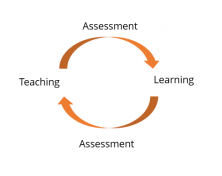Paper Evaluation
In Singapore, as illustrated in the diagram below, the classroom assessment is an integral part of the interactive teaching and learning process. It is an ongoing process through which teachers collect information about their student’s learning to inform and support teaching. An important resource of assessment is feedback, which should be timely and exhaustive. Students should be informed about where they have gaps in their learning and what they should be doing to address these gaps.

Types of Assessment
In Singapore, they use quantitative classroom assessments, like traditional pen and paper quizzes and exams, in order to assess what their students have learned and report the result of the assessment as a grade or qualification.
Yet they are aware that the classroom assessment should center on helping the students improve their learning while exploring a wide variety of assessment strategies. However, assessments that allow teachers to collect information are not readily available through traditional methods, but they are essential for supporting the learning process.
Integrating classroom assessment and instruction
In Singapore, the teachers integrate the assessment into the speech and activities in the classroom. For example, the teacher can see how students solve a problem and have them explain the strategies used to solve it. Teachers also get the students involved in evaluating their own work and inviting them to reflect on their own learning, including what they think they can, or should, do to improve it.
The teachers in Singapore also constantly ask their students questions to encourage learning based on previous knowledge. This question and answer dynamic allows the teacher to correct a misconception or reinforce a good idea. Open-ended questions also encourage the students to consider alternative approaches.
They reserve a lot of time in their classes for this kind of dynamic, allowing students to formulate their thoughts, communicate, share their ideas and listen to the ideas of others. Through this process, students learn to articulate their thinking to deepen their understanding and develop confidence in discussing mathematics.
Learning assessments require new forms of evaluation in the classroom, they imply changes in a teacher’s roles as well as student expectations. By integrating assessments and instructions students will be more committed, and more responsible, for their learning.
At Smartick, we also consider assessments to be important and design feedback for each activity to facilitate learning. If you would like to try it, log on to Smartick and try it for free.
References:
- Mathematics Syllabus: Primary One to Five. Ministry of Education, Singapore
- Smartick Lands in Singapore, a Country with One of the Most Challenging Education Systems in the World.
- Singapore: Experiences in Learning
Learn More:
- Singapore: Experiences in Learning
- Teaching Principles and Learning Phases of Singapore Math
- Returning the reviews favor!
- Theoretical Framework of the Singapore Method
- Evidence-Based Education: The Story of Craig Barton







